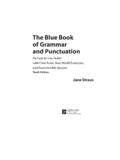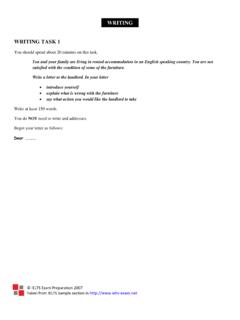Transcription of Course Material and Supplements - ELEKTRON KİTABXANA
1 Course Material and Supplements For Academic and General Training Candidates Ebrahim Tahasoni Cert TESOL, Academic ielts Version ( ). Downloaded from For more resources, visit or Master ielts speaking Ebrahim Tahasoni What's the test like? The speaking test will take about 11 to 14 minutes to complete. There are three sections in total. These are as follows: Part 1 Introduction and interview. This lasts for about 4 to 5 minutes. In this section, the Examiner will introduce him/herself and ask you questions about yourself. Part 2 Individual long turn. Part 2 lasts for about three to four minutes. In this section, you will be asked to prepare and give a short talk for about one to two minutes on a given subject. Part 3 Two-way discussion. Part 3 lasts for 4 to 5 minutes. In this section, you will be asked to have a short discussion linked to the subject you spoke about in part 2. Assessment Overall, you will be assessed on your: fluency and coherence vocabulary range of grammar and accuracy pronunciation.
2 This means that all of your preparation must concentrate on these areas. Check the ielts speaking band descriptor for a more detailed description of the criteria the examiner will use to assess your speaking . Page 1. Master ielts speaking Ebrahim Tahasoni Part1 - Introduction and interview During Part 1, the Examiner will introduce him/herself and ask you some questions about yourself. This is the start of the test, and it will set the scene for the remainder. Think of the Examiner as being just like your teacher. In fact, most examiners are usually teachers, so they'll understand how you feel, because some of their own students will feel the same. They're not there to catch you out. Indeed, they'll want you to do well and will do everything that they can to make you feel comfortable. The Examiner has a set of questions. When you're asked a question, try to answer it without repeating the whole question in your answer. For example: If you are asked What's the most interesting thing about your hometown?
3 '. Don't reply The most interesting thing about my hometown is '. Just say It's '. Then, you can expand on your answer, if possible, by adding something like: Most people find this interesting because '. You can then add a synonym of the words used by the Examiner. So, instead of interesting say something like: Most people find this fascinating because '. So, don't try to fill up' your answer by repeating the question back to the Examiner and try to add a little extra' to show off your English. Remember, it's a conversation with the Examiner. He/she will want to see if you are fluent and coherent. They can't do this if you just repeat back large chunks of a question! Examiners are looking for your own ideas. The topics are usually very familiar and the Examiner normally asks you about yourself. Try to give examples and create ideas, willingly. Never say, I don't know.'. Page 2. Master ielts speaking Ebrahim Tahasoni Giving Full Answers Impress the examiner with your ability to give full answers to his or her questions.
4 To avoid simple yes or no answers or short responses generally, try using the REDS method to add detail to your initial response: Give a Reason Offer an Example Give Details Speculate REDS in Action: Question: What job would you like to do? Answer (Reason): I've always wanted to be a vet. I love animals and I think it would be a very rewarding job. Question: What skills do you need for this job? Answer (Example): I think you need to be sensitive to people's feelings. If you're dealing with their sick or injured pets, you need to be honest but also appreciate how they might be feeling. Question: Where do you come from? Answer (Detail): I come from Mashad in Iran. It's well known as a religious centre and is really crowded most of the year. Question: Do you often go out to restaurants? Answer (Speculate): Unfortunately, since I had my baby, no. If I had the chance I'd really like to eat out more often, especially in Chinese or Italian restaurants. Page 3. Master ielts speaking Ebrahim Tahasoni Sample Part One Questions Family Do you have a large family or a small family?
5 Can you tell me something about them? How much time do you manage to spend with members of your family? What sorts of things do you like to do together? Did/Do you get on well with your family? [Why?]. Accommodation What kind of accommodation do you live in? What's it like? Have you always lived there? What are the main advantages of this [accommodation]? What changes would you like to make to improve it? Would it be easy for you to move to another accommodation? Do many people in your country live in such accommodation? Neighbourhood Which part of town do you live in? What's it like? What kind of shops are there in your neighbourhood? Do you get along well with your neighbours? What's difficult about living there? Education (students). What do you study? What is special about this subject? Is there anything you find difficult about it? Where do you study ? What's your university/college like? Education (graduates). Do you have higher education? What have you studied at university? What did you like about your studies?
6 Was there anything you found difficult? Job What's your job? Is it a common job in your country? What are your working hours like? Do you get a lot of vacation and off time? Are you thinking of changing your job? Page 4. Master ielts speaking Ebrahim Tahasoni Cold weather Have you ever been in very cold weather? [When?]. How often is the weather cold where you come from? Are some parts of your country colder than others? [Which parts?]. Would you prefer to live in a hot place or a cold place? [Why?]. Laughing What kinds of things make you laugh? Do you like making other people laugh? [Why/Why not?]. Do you think it's important for people to laugh? *Why/Why not?+. Is laughing the same as feeling happy, do you think? [Why/Why not?]. Keeping in contact with people How do you usually contact your friends? [Why?]. Do you prefer to contact different people in different ways? [Why?]. Do you find it easy to keep in contact with friends and family? [Why/Why not?]. In your country, did people in the past keep in contact in the same ways as they do today?
7 [Why/Why not?]. Daily Routine What would you like to change in your daily routine? Are all your days the same? Tell me about your typical weekday and your typical weekend. What is the balance of work/study and free time in your normal day? Visitors What would you suggest a visitor should see and do in your country? Are there any traditional arts or music you would recommend? Tell me about the kind of foreign visitors or tourists who go to your country. In what ways has tourism changed your country? Festivals Tell me about the most important festival in your country. What special food and activities are connected with this festival? What do you most enjoy about it? Do you think festivals are important for a country? [Why?]. Dancing Do you enjoy dancing? [Why/Why not?]. Has anyone ever taught you to dance? [Why/Why not?]. Tell me about any traditional dancing in your country. Do you think that traditional dancing will be popular in the future? [Why/Why not?]. Page 5. Master ielts speaking Ebrahim Tahasoni Musical instruments Which instrument do you like listening to most?
8 [Why?]. Have you ever learned to play a musical instrument? [Which one?]. Do you think children should learn to play a musical instrument at school? [Why/Why not?]. How easy would it be to learn to play an instrument without a teacher? [Why?]. Traffic where you live How do most people travel to work where you live? What traffic problems are there in your area? [Why?]. How do traffic problems affect you? How would you reduce the traffic problems in your area? Your friends Do you prefer to have one particular friend or a group of friends? [Why?]. Are your friends mostly your age or different ages? [Why?]. What do you like doing most with your friend/s? The last time you saw your friends, what did you do together? What makes a friend into a good friend? Do you think it's important to keep in contact with friends you knew as a child? *Why/Why not?+. Food and cooking What kinds of food do you like to eat? What kind of new food would you like to try? [Why?]. Do you like cooking? [Why/Why not?]
9 ] What was the last meal you cooked? Do you prefer home-cooked food or food from restaurants? [Why?]. Leisure Do you have any hobbies or interests? [What are they?]. How did you become interested in (whatever hobby/interest the candidate mentions)? What is there to do in your free time in (candidate's hometown/village)? How do you usually spend your holidays? Is there anywhere you would particularly like to visit? [Why?]. Your favourite place What place do you most like to visit? How often do you visit this place? Why do you like it so much? Is it popular with many other people? Has it changed very much since you first went there? [In what way?]. Your country Which part of your country do most people live in? Tell me about the main industries there. How easy is it to travel around your country? Has your country changed much since you were a child? Page 6. Master ielts speaking Ebrahim Tahasoni Colour What's your favourite colour? *Why?+. Do you like the same colours now as you did when you were younger?
10 [Why/Why not?]. What can you learn about a person from the colours they like? Do any colours have a special meaning in your culture? Entertainment Do you prefer relaxing at home or going out in the evening? [Why?]. When you go out for an evening, what do you like to do? How popular is this with other people in your country? Is there any kind of entertainment you do not like? [Why/Why not?]. Clothes How important are clothes and fashion to you? [Why/Why not?]. What kind of clothes do you dislike? [Why?]. How different are the clothes you wear now from those you wore 10 years ago? What do you think the clothes we wear say about us? Fruits Do you eat fruits? How often do you eat fruits? Where do you buy your fruits from? Do you think it's important for people to eat fruits? *Why/Why not?]. Books Do you like reading books? What kind of books do you like to read? [Why?]. Where do you like to read? [Why?]. Do others in your family read books too? Do you usually buy your books from a special place?
















